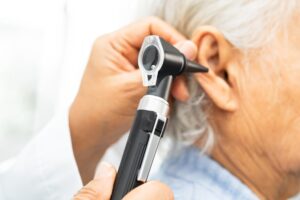Hearing loss is common in the United States
Some research estimates that nearly 50 million Americans experience hearing loss to some degree, and of those nearly 50 million, only a very small percentage are taking steps to treat their hearing loss.
While we can only speculate why people choose to ignore their hearing loss — be it social stigmas, grappling with aging, facing the reality of health concerns, or not knowing who to turn to in order to get the right treatment — the fact of the matter is that hearing loss has a high prevalence in our society, and with its commonality come difficulties in communication.
Do we make these same choices when it comes to our dental or eye health? Certainly not. It’s quite common and accepted for all of us from a very early age to get regular checkups for our teeth, eyes, and general health, but, for some reason, our hearing health can sometimes slip through the cracks.
We’re here to help make a positive change in this regard. We want everyone to have the opportunity to be together, enjoy each other’s company, and be deeply engaged in the conversation. It’s gonna take a little bit of work to make that happen, but we believe we can do it!
We all have a responsibility to make communication easier
When we’re interacting with those folks who are experiencing hearing loss, whether they be friends, family members, colleagues, or anyone else in our community, we believe that it’s important to help them have the best communication experience possible.
This means that we who have what might be called “normal” hearing — or even those with hearing difficulties, for that matter — can learn a few simple ways to make the communication and understanding process a little easier.
Consider the noise level of your environment
Are you in a place that is going to pose a challenge to the person you’re speaking with, no matter what considerations you might be making? If possible, switch venues, or find a quieter place in the venue that you’re already in so that you can have an easier time having your conversation. If you’re in a restaurant, ask your server if you can be seated away from an open kitchen or away from high-traffic areas like restrooms, exits, and the like.
Face who you’re speaking with
This might seem like an obvious recommendation, but this is something that we don’t always do when communicating with others. Facing who you’re speaking to, making eye contact, and giving them the opportunity to read your facial expressions makes a huge difference in being able to communicate more effectively.
Consider the lighting of your environment
This isn’t something you’re always going to have control over, but much like facing a person and giving them the opportunity to read your facial expressions, being in a well-lit space makes a world of difference to the person on the receiving end of your words. If they can see you, they’ll have an easier time understanding you.
Slow it down
We can all get excited when we’re telling a story, but it’s important to remember that when we’re speaking with someone who has a hearing loss, it might take them an extra millisecond or two to process what it is that we’re trying to say. Let’s be conscious of this, slow down our pace, and speak clearly and carefully. After all, we want them to find this story just as compelling as we do, right? Give them the opportunity to by going at a pace that makes sense for them!
Be an active communicator
It’s not just the job of the person who has a hearing difficulty to pay attention to things like facial cues. If you’re a more active communicator, then you’ll be more likely to understand when what you’re saying is or is not being understood. Don’t be afraid to pause, don’t be afraid to ask if what you’re saying is being communicated effectively, and look for ways in which you can be more easily understood, either by slowing down, finding different words to share your, or asking who you’re speaking with how you can make the conversation smoother.
Play to the strengths of who you’re speaking to
Hearing loss isn’t usually a perfectly balanced thing. What we mean by this is that it’s likely the person you’re speaking to has one ear that is probably better than the other. Ask them if they have a preference as to where you should be positioned before you begin your conversation. This will go a long way in not only helping them hear and understand you better, but it will show a level of empathy to their experience that they probably don’t get enough.
Want to learn more about how you can be a better, more empathetic communicator? Want to learn more about living your best life with the best possible hearing? Then contact Colorado Ear Care TODAY. We’d love to see you for all your hearing needs.




